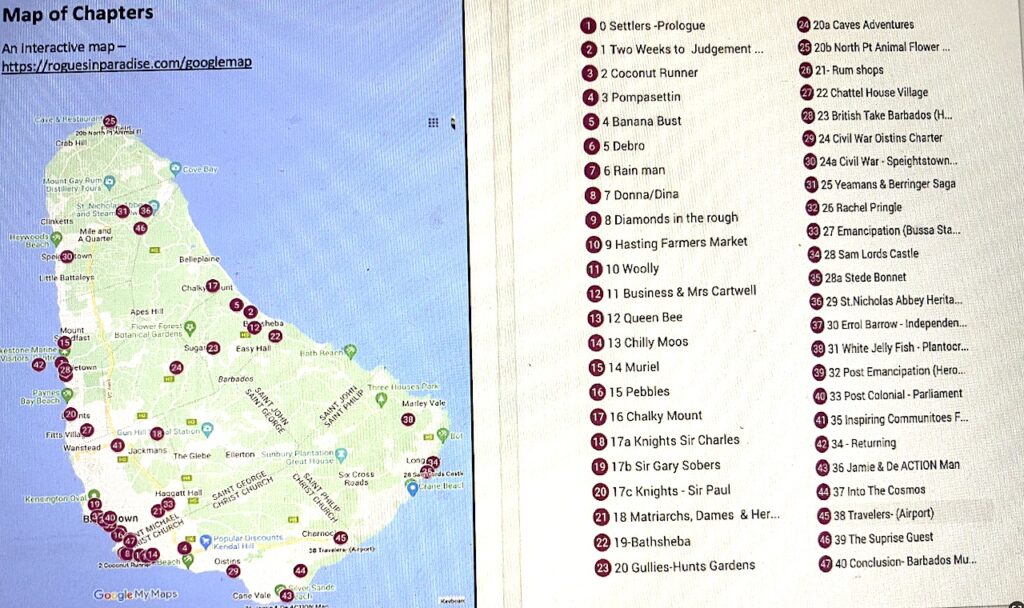Rogues Antagonist – A Review of the Yardfowl Character!
Ian R. Clayton’s latest book, Rogues in Paradise, introduces a dynamic character of Barbados’ Yardfowl. In the book, Yardfowl is a prominent antagonist who challenges colonial biases and adds critical depth to the narrative. He appears in several chapters, offering a unique perspective that balances the story and highlights the impact of colonial history on contemporary Caribbean life.
Yardfowl is sometimes angry, seldom conciliatory, but always on point. He makes sharp, witty, and uniquely Bajan comments on politics, society, race, and bigotry. He injects a controversial character into the story of Barbados.
Much is said about the Yardfowl, which is a prominent feature in Barbados. Books have been written about this pseudo-character, and there are even “Yardfowl Chronicles” tracing the latest news and activities of this enigmatic Bajan-bird character.
Barbados visitors will meet the Yardfowl on the beach and see them in almost every backyard. They are proud and always in charge as they furrowed and strutted across the island. Yardfowl is a worthy adversary to the Author in Rogues in Paradise. He disagrees with any conciliatory tone in the book, reminding the reader that Slavery was an abomination and a few moments of humanity were an exception not worthy of mention.
As he says at one point:
“De Author mek he point saying de call for reparation not supposed to be a story of horrors. But I knows for a fact, dat dem same horror-show is what get the church and high-up to tek note. Dey had to be shame cas dey not hearing de cry from all-we when we say it nice. It aint no good saying like it would be good if you all gives us some money for all we hardship you youself cause. Never gonna wok dat way. Ya have to knock em on the head with a big old catfish to get dey attention. Sir Hilary know what he doing painting de Darkes picture. Rose garden ain’t going to get no attention. Yah got to jolt dem an wake dem up to de gravity of de situation. Else de go on sleeping, dreaming all is fine.”
Yardfowl is a fictional character created by the author. Based on insights and conversations he has had with real people, Yardfowl personifies an alternative voice that puts things into perspective.
Yardfowl: The Antagonist with a Rebel Voice
Unlike colonials who may speak of slavery with guilt, survivors express emotions shaped by severe physical, emotional, and mental abuse, inhumane degradation, malnutrition, and inherited trauma. Despite these hardships, they do not harbor hatred towards white people. Yardfowl embodies this resilience and wisdom. He is outspoken and articulate, having attended compulsory secondary school. He speaks in Bajan slang, making poignant points, often contesting the status quo.
The Real Bajan Yardfowl
The character of Yardfowl draws inspiration from the real Bajan Yardfowl, a chicken commonly seen in backyards across Barbados. They are distinctive characters, symbolizing independence and freedom. They roam freely across various landscapes, including backstreets and highways, valleys, beaches, golf courses, and even stately estates, embodying a sense of defiance, knowing no boundaries. This symbolism is seamlessly integrated into the character of Yardfowl in “Rogues in Paradise,” highlighting a parallel between the free-spirited nature of these birds and the indomitable spirit of the Bajan people.
Thematic Connections with Rawle C. Eastmond’s “Yardfowl”
The Yardfowl in “Rogues in Paradise” and the one fiction character of Rawle C. Eastmond’s “Yardfowl” share thematic similarities. Both characters challenge societal norms and provide thought-provoking insights into post-colonial Caribbean life. Eastmond’s narrative offers a critical perspective on historical and contemporary political and social issues. Similarly, in “Rogues in Paradise,” Yardfowl addresses the legacy of colonialism and its impacts on Caribbean society, ensuring that nothing is overlooked or misrepresented. He expresses his views passionately and cuts through pretense with a unique Bajan flair.
For example, he thinks little of British stamina and aptitude; about British workers, he says,
“Sun bu’n he, fry the head, an mek he fall like fly, dead n’ die.”
Regarding planters, he remarks:
“Dem like hard-boiled egg, no feelin’, jus’ pushin’, n’ pulin’ more sugar cash fo’ de colonial massa who own slave like he own ram goat.”
These vivid expressions capture the essence of Yardfowl’s perspective, blending humor with a critical eye toward historical injustices.
Summary Video
“Rogues in Paradise” gives voice to the unrepresented and the powerful, with Yardfowl standing out as a character who challenges colonial biases and societal norms. His boundary-less attitude and use of Bajan slang highlight the wisdom and resilience of Caribbean people, making him a pivotal figure in the narrative. This exploration of Yardfowl offers readers a deeper understanding of post-colonial Caribbean life and the enduring impact of colonial history on contemporary society.
For those interested in exploring these themes further, “Rogues in Paradise” vividly portrays a unique culture and its people, who have overcome significant challenges with defiance and dignity. This narrative ensures that the voices of the unrepresented and the powerful are heard equally, and nothing is overlooked or misrepresented, making it a powerful addition to Caribbean literature.
Get Involved
Grab sample chapters and get invited to the launch of “Rogues in Paradise.” Experience the insightful commentary and vibrant storytelling that brings Yardfowl and the spirit of Barbados to life.

https://Sample.RoguesinParadise.com
Yardfowl the antagonist, challenging colonial biases, adding critical depth to the narrative. He offers a unique perspective that highlights the enduring impact of colonial history on contemporary Caribbean life.
Related links
Previous blog on Rogues in Paradise
For more details on the politics of Yardfowl, visit the Internet Archive page on Rawle C. Eastmond’s “Yardfowl.” and visit the Yardfowl chronicles.
The Book of Barbados People, Culture and History
The Eyes are foreboding, staring off into the distance, away from you through the clouds on a misty day. It’s mysterious; the eyes look back at the troubled past, but still, it is paradise.
Find your ideal Barbados accommodation...







